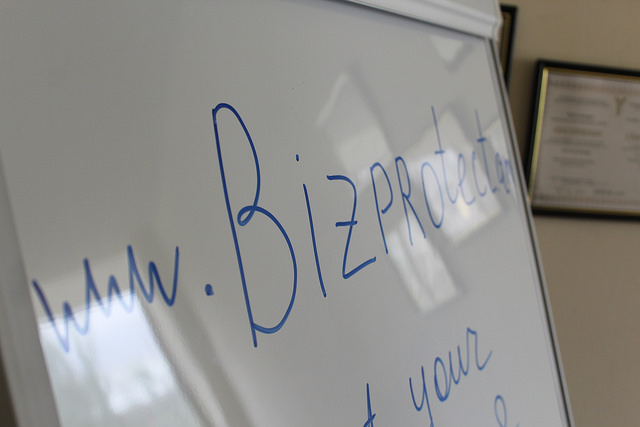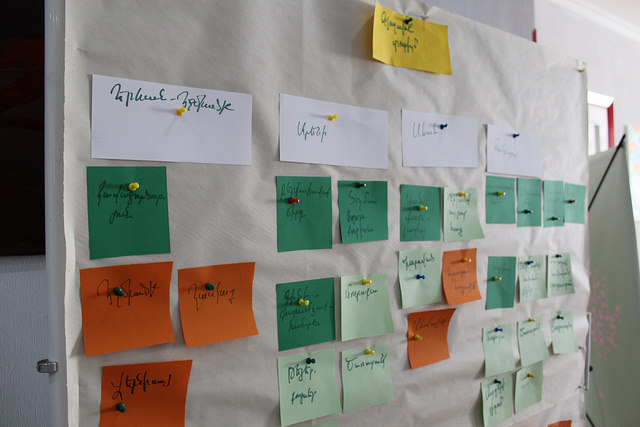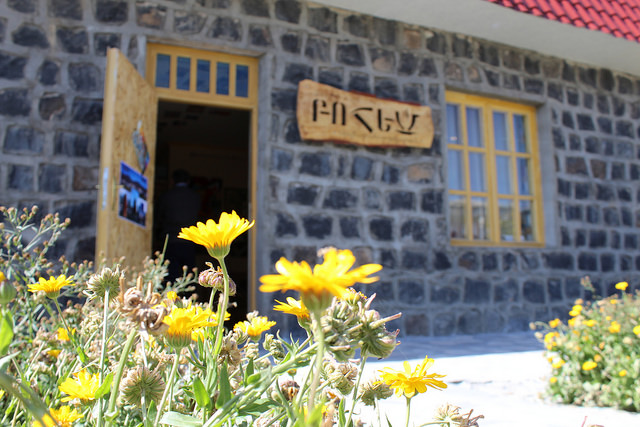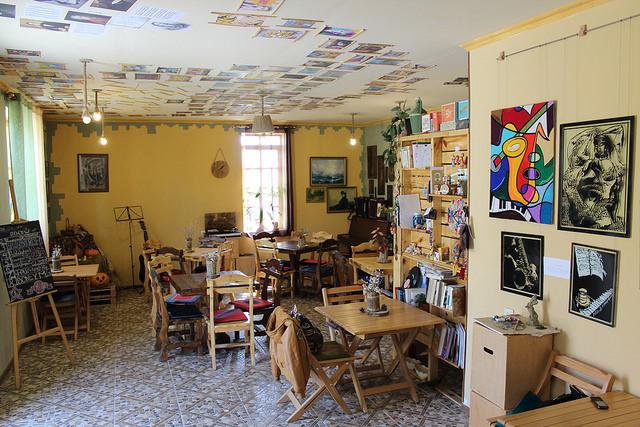Many small and medium-sized enterprises (SME) in Armenia feel that their main problems start at their own borders, with the taxes and customs regulations applied by the Armenian authorities. However, few of them raise these issues, as most entrepreneurs are concerned about confidentiality and the consequences of their actions – factors that create obstacles to business development.
This is where bizprotect.am comes in, a new whistle-blowing website where SMEs can anonymously report corruption risks and other problems faced by their enterprise. Bizprotect.am has been created under the EU-funded SMEDA project (Support to SME Development in Armenia), part of the European Union’s broader support for private sector development under the EU4Business initiative.
As soon as a business submits a complaint, experts at bizprotect.am examine the report and provide a quick response. The experts do not know who has submitted the report, meaning it is 100 per cent confidential. The website was developed by the Union of Technology Enterprises (UITE), with its consortium partners the Armenian Lawyer’s Association (ALA) and the European Business Association in the framework of the SMEDA project. The website was launched in April 2017. According to ALA lawyer Mariam Zadoyan, they have already received 17 reports within the last five months, 15 of those complaints have been accepted by the Project experts, corresponding applications have been presented to public bodies and 4 reports have already been resolved. The accepted reports concerned various sectors: from taxation, customs, public procurement to free economic competition.
UITE lawyer Arkadi Sahakyan explains that, within the framework of the programme, they have had numerous meetings with business representatives both in the capital Yerevan and in regions around Armenia. They have discussed issues relating to tax and customs services, as well as issues of broader economic competitiveness: “During those meetings we have raised several issues, which we will communicate to the Government of Armenia in the form of suggestions and recommendations. And after the end of the programme, we will monitor whether our suggestions have been accepted and implemented. As those issues came out in practice, they hinder the development of the businesses. And we want to have a strong economy which will help to step up and develop our country.” It is noteworthy that a number of systematic reforms submitted have already been included in the Action Plan on Identification and Neutralization of Corruption Risks in the field of State Revenue Collection of RA Anti-Corruption Strategy for 2015-2018, such as the introduction of “Blue Chanel” in customs sector, which will facilitate the work of businesses while importing and etc. Besides, in the framework of the project free legal advice has been provided by side of ALA for approximately 1000 SMEs in Yerevan and 4 marzes. ALA also prepared a report on “Business Environment in RA. Main Challenges and Recommendations” which will be presented to RA Government.
According to Diana Sarumova, Executive Director of the European Business Association, the project has succeeded in creating a dialogue platform for the public and private sectors which business representatives trust: “During this year we can already feel that the level of trust is increasing. Businesses are starting actively to voice their problems. As a result, we have many success stories. And we have realised that, when you work together, you can achieve great results in Armenia.”
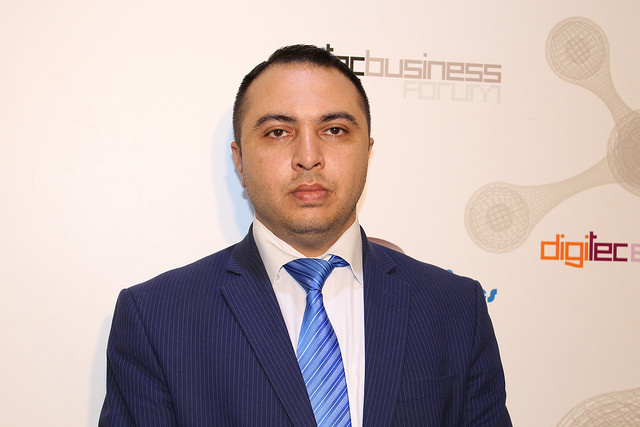
Arkadi Sahakyan
UITE lawyer Arkadi Sahakyan explains that, within the framework of the programme, they have had numerous meetings with business representatives both in the capital Yerevan and in regions around Armenia. They have discussed issues relating to tax and customs services, as well as issues of broader economic competitiveness: “During those meetings we have raised several issues, which we will communicate to the Government of Armenia in the form of suggestions and recommendations. And after the end of the programme, we will monitor whether our suggestions have been accepted and implemented. As those issues came out in practice, they hinder the development of the businesses. And we want to have a strong economy which will help to step up and develop our country.” It is noteworthy that a number of systematic reforms submitted have already been included in the Action Plan on Identification and Neutralization of Corruption Risks in the field of State Revenue Collection of RA Anti-Corruption Strategy for 2015-2018, such as the introduction of “Blue Chanel” in customs sector, which will facilitate the work of businesses while importing and etc. Besides, in the framework of the project free legal advice has been provided by side of ALA for approximately 1000 SMEs in Yerevan and 4 marzes. ALA also prepared a report on “Business Environment in RA. Main Challenges and Recommendations” which will be presented to RA Government.
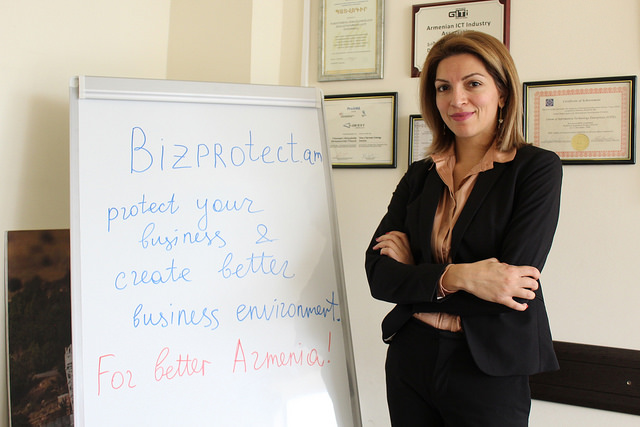
Diana Sarumova
According to Diana Sarumova, Executive Director of the European Business Association, the project has succeeded in creating a dialogue platform for the public and private sectors which business representatives trust: “During this year we can already feel that the level of trust is increasing. Businesses are starting actively to voice their problems. As a result, we have many success stories. And we have realised that, when you work together, you can achieve great results in Armenia.”
At the same time, and with the same broader aim of improving the business climate in Armenia, SMEDA has created a second portal to support SME activities in Armenia – Palat.info. The portal has been developed by the Gegharkunik Chamber of Commerce and Industry (GCCI) together with the Shirak Chamber of Commerce and Industry and Syunik Chamber of Commerce and Industry.
Palat.info provides consultation, information and advocacy to SMEs. It has already provided 400 consultations and 70 advocacy services and has received 50 messages from business representatives.
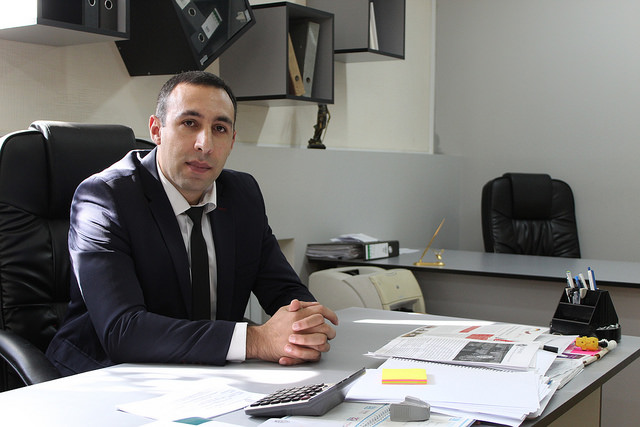
Artyom Grigoryan
Artyom Grigoryan, Director of GCCI, appreciates the continuity of the programme: “One of our priorities has become the reinforcement of two other chambers, as after the programme they will continue to provide information and consultation. This has become our main trump card. That is to say, we managed to provide the consultation and at the same time we have reinforced two chambers in the country’s regions: one in Shirak, the other one in Syunik.”
Grigoryan says they plan to reinforce chambers of commerce and industry in other regions of Armenia as well: “We believe that there should be an independent institution which will support businesses and which will be a mediator between the state and businesses.”
But improving the business climate is just one of the things that SMEDA does. The programme, which is co-funded by the European Union and the German Federal Ministry for Economic Cooperation and Development, is implemented as part of the German development agency GIZ’s programme for ‘Private Sector Development in the South Caucasus’. SMEDA aims to create employment opportunities in various sectors by increasing the number of SMEs established in Armenia, as well as increasing the competitiveness of existing SMEs. As well as improving the business environment, other measures include providing grants and technical assistance to develop new innovative products for domestic and global markets. Under EU4Business, the EU contributes €6.4 million to SMEDA over its duration from January 2016 to December 2019.
SMEDA has already announced a second round of a call for proposals. Applicants must apply as a Consortium of Business Membership and/or Business Support Organisations. The deadline for the applications is 10 November 2017.
Strong SMEs are vital to economic growth and inclusive development, which is why SME support is one of the main pillars of EU development cooperation with Armenia, says the EU Delegation to Armenia, adding that small businesses play an essential role in building modern economies, due to their capacity to innovate and adapt to fast-changing markets.
Indeed, SMEDA is just one of several programmes funded by the EU under its EU4Business initiative, which covers a wide range of areas across several sectors: business advisory services, access to a newly established private equity fund representing more than €40 million of potential new investment through the European Bank for Reconstruction and Development (EBRD); access to finance via the European Investment Bank (EIB); support to a range of SME development issues under the SMEDA project, and support to social entrepreneurship.
Community Development through Social Entrepreneurship (CODE-SE) is another project that falls under the EU4Business initiative. It contributes to sustainable community development and to improving the capacities of civil society organisations (CSOs) and SMEs in generating income through running social entrepreneurship projects. Under the project, 27 CSOs from different parts of Armenia have participated in training courses, and 10 of them have received funding. The EU is contributing €289,379 to CODE-SE, which began in October 2015 and will run until December 2017.
The Sevan Youth Club NGO is one of the lucky ten. It started its Bohem Studio-Teahouse in July 2017, a small and cozy café near the town hall of Sevan, one of the most popular resorts in Armenia close to Lake Sevan. It is indeed a cultural centre, as here you can get acquainted with Armenian culture, history and traditions, and acquire various souvenirs made by local artisans. Every detail is well thought-out, even the ceiling, where you will find hanging portraits of Armenian writers and public figures, as well as photo reproductions of world-renowned canvases.
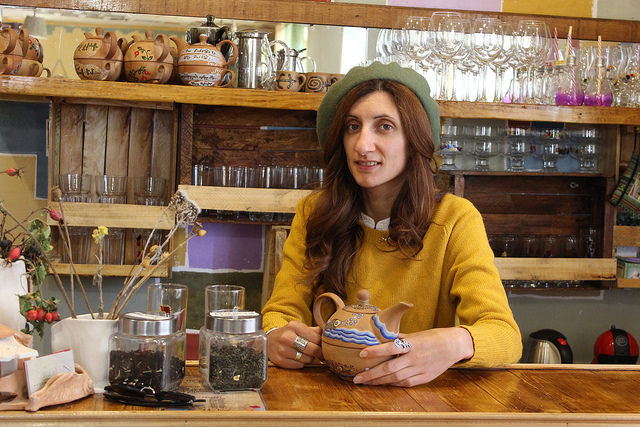
Gohar Mnatsakanyan
Gohar Mnatsakanyan, president of the Sevan Youth Club, is the founder of the teahouse. She explains that the ‘Community Development through Social Entrepreneurship’ initiative attracted their attention, as it also has an educational component: “We liked it as it seems like you are in a boat which is floating in the sea, and you cannot laze about and cannot return. And that boat brought us here. We also like the fact that the grant gives an opportunity to self-finance. Hence, after the termination of the grant, you can continue your activities. In the end, it becomes an aid to start your own business.”
All the people who are working with the organisation are youth volunteers, such as Hannah Huntley from Washington DC in the United States. “This is what that community needed. We did surveys ahead of the project, asking the community what they needed, how much money they were going to spend. And we made a decision to be a smoke-free teahouse. There are no other places in Sevan that are smoke-free. So it is hard to go and have a coffee with your kids with you. There are cafés in Sevan, but much like the other places outside of Yerevan, they are not welcoming for other members of the family.”
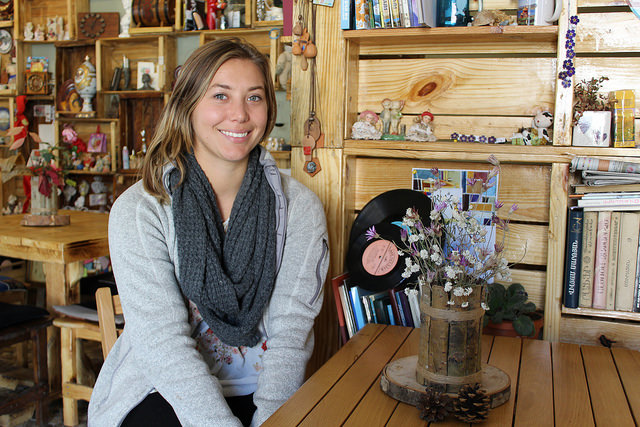
Hannah Huntley
According to Hannah, people in Sevan needed a space where they could relax from their everyday problems. ‘Bohem’ has become that place: “At first people were a little bit sceptical, they had their tea and left right away, they did not realise that they could stay and hang out. But now that we have been open for a little bit longer, people come and they hang out, they realise that it is OK to have a soda, to meet your friends and chitchat.”
While the long term purpose of EU4Business is to contribute to the improvement of the business and investment climate for SMEs in Armenia, it is already showing how EU support can give more confidence to small and medium-sized businesses through better access to finance, better protection and small business advice. Although the programme continues, its impact is already visible and has positively affected the Armenian business world.
Author: Ami Chichakyan
This article was produced in the framework of the EU Neighbours east project. The views expressed are solely those of the author of the article.




















































